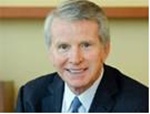Autonomy acquisition ousts HP chairman, two directors
05 Apr 2013
Three members of Hewlett-Packard board, including its chairman Raymond J Lane have resigned, just two weeks following their narrow re-election.
 The resignation comes after investors criticised the management for botching the $11-billion acquisition of British software company Autonomy. Lane and the two directors were seen as being the ones closely linked to the deal.
The resignation comes after investors criticised the management for botching the $11-billion acquisition of British software company Autonomy. Lane and the two directors were seen as being the ones closely linked to the deal.
Two weeks ago, Lane and directors John Hammergren and Kennedy Thompson won a re-election with the slimmest of margins.
Lane, a former president of Oracle Corp, said he would quit as chairman but remain as a director after reflecting on a close vote of stockholders for his re-election to the board. He would be succeeded by Ralph Whitworth, an independent director.
According to analysts, the development would give Meg Whitman, HP's chief executive, a little more breathing room as she continued with her long and painful effort to work a turnaround at the company.
Though HP is one of the biggest technology companies in terms of sales, for years it has suffered financial losses, bungled acquisitions, as also turbulence in the executive ranks and boardroom.
According to Whitman, who took charge in September 2011, the company would be on the profitability track in 2014 with robust growth in the years after.
According to some analysts the pressure was on Whitman, but a housecleaning of the board had ''bought her a year.''
Lane, who would continue to serve on the board, would be temporarily succeeded by Ralph Whitworth, an activist shareholder who joined the HP board in November 2011 and had been a backer of Ms Whitman.
Lane said after reflecting on the stockholder vote last month, he decided to step down as executive chairman to reduce any distraction from HP's ongoing turnaround. He added, since he joined HP's board a little over two years ago, he had been committed to board evolution to ensure HP's turnaround and future success. He added, he was proud of the board and the progress it had made to date in restoring the company. He said he would continue to serve HP as a director and help finish the job.
According to Whitworth, Ray, John and Ken were terrific leaders, and they were passionate about doing the right thing for HP. He added, the board would continue to recruit outstanding directors, strengthen governance and do the best it could, the best it knew how - for stockholders.
He added, Meg was leading a Herculean turnaround, so most of all, the board needed to build and maintain the best possible leadership structure for Meg and HP's entire team to succeed.
Whitman said Ray, John and Ken had invested a part of themselves in HP. She added, their leadership was reflected in the early success the board had in turning the company around. She said she was grateful that Ray would continue to serve, and wished John and Ken the very best.
HP's problems started in 2006 when it sacked its then chairman Patricia Dunn over spying on directors, employees and reporters (See: Mark Hurd takes over at HP as Patricia Dunn quits). It then elevated CEO Mark Hurd to chairman, only to sack him four years later over a sexual harassment charge bought on by a former company contractor (Cathie Lesjak is HP's interim CEO as Hurd bows out).
The world's third-largest personal computer maker then hired Leo Apotheker, a former CEO at German business software firm SAP, but forced him to resign less than 11 months at the helm for failing to turn the ailing company around and having paid over the hill for Autonomy.
In September 2011, former head of eBay, Whitman was hired to run the company along with Ray Lane, who was made executive chairman of HP in a board shuffle ( HP fires Apotheker, appoints former eBay head Meg Whitman as CEO).
A year later into the job, Whitman was forced to write down $8.8 billion non-cash impairment charge – a majority of it related to the acquisition of Autonomy (HP takes $8.8 bn charge on Autonomy acquisition).
HP, which bought the software company for over $10 billion in 2011, had to write off more than $5 billion due to alleged serious accounting improprieties, misrepresentation and disclosure failures prior to its acquisition.


















